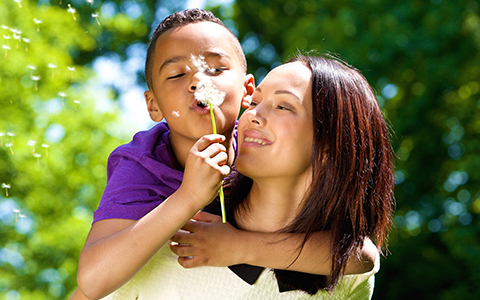 An allergic reaction occurs when our body comes in contact with a substance that is generally considered harmless, but our immune system attacks it as if it were a harmful germ or virus. These allergy-triggering substances are known as allergens.
An allergic reaction occurs when our body comes in contact with a substance that is generally considered harmless, but our immune system attacks it as if it were a harmful germ or virus. These allergy-triggering substances are known as allergens.
Some people have allergic reactions to allergens that are around all year—such as animal dander, foods, mould, dust, and certain medicines. Others are allergic to substances that only appear at certain times of the year—such as pollen, grass, and ragweed. Allergies that only cause symptoms at certain times of the year are called seasonal allergies.
The Sneezin’ Season
Seasonal allergies (which are also known as hay fever and allergic rhinitis) are usually worst in the spring and summer when plants are blooming and there is a lot more pollen in the air.
Common symptoms of seasonal allergies include:
- Congestion
- Coughing or the need to clear the throat
- Dark circles under the eyes
- Fatigue
- Headache
- Itchy eyes, nose, and throat
- Post-nasal drip (fluid from the nose draining into the throat)
- Runny eyes and nose
- Sneezing
You don’t need to suffer just because you turned another page on your calendar. There are some simple steps you can take to minimize your exposure to the allergens that trigger your symptoms. For example, check your local news media or weather stations (TV, radio, newspaper, internet sites) to learn the current pollen levels in your area. When the pollen count is high, the following tips can help you prevent allergic reactions.
- Stay indoors on dry, windy days. Try to schedule your outdoor activities after a good rain, which helps clear pollen from the air.
- Whenever possible, avoid mowing the lawn or doing other gardening chores. If you have to do these chores yourself, wear a face mask while doing them.
- When you go back inside, remove the clothes you were wearing and take a shower to wash the pollen from your skin and hair.
- Don’t hang clothes outside to dry.
- Use the air conditioning in your car and home instead of opening the windows.
- Use high efficiency particulate air (HEPA) filters on forced air heating and air conditioning systems.
- Use a dehumidifier to keep the air in your home dry.
- Vacuum your floors frequently to remove pollen that has gotten tracked in from outside.
Treating Seasonal Allergies
Sometimes taking preventive measures isn’t enough, and you need to treat the allergy symptoms that you develop. Home treatment is generally all you will need to relieve your discomfort. For example, you can use a saltwater nasal wash to flush out the mucous and allergens and open your nasal passages. There are also prescription and nonprescription medications that can relieve some of the symptoms. For example:
- Antihistamines can help relieve sneezing, a stuffy or runny nose, itching, and watery eyes.
- Decongestants can provide temporary relief from nasal stuffiness. These drugs are sometimes used to treat a more severe stuffy nose.
- Combination antihistamine and decongestant medicines can provide the benefits of both types of medication.
- Corticosteroid nasal sprays can improve a range of symptoms by reducing swelling and mucus in the nasal passageways.
- Cromolyn sodium nasal spray prevents the immune system from releasing the chemicals that cause the symptoms of seasonal allergies. It works best if you start the treatment before you are exposed to the allergens that trigger your symptoms.
It is always wise to check with your doctor or London Drugs pharmacist before starting a new medication to make sure that it is right for you and that it will not affect any other health conditions you may have or interfere with any other medications you are taking. If you know you will have allergies every spring, stock up early on preventative medications like antihistamines before you anticipate you will need them. Your pharmacist can also prescribe preventative or treatment medications for seasonal allergy symptoms such as eye drops, nasal sprays, or oral medications. Ask us, we are ready to help!





